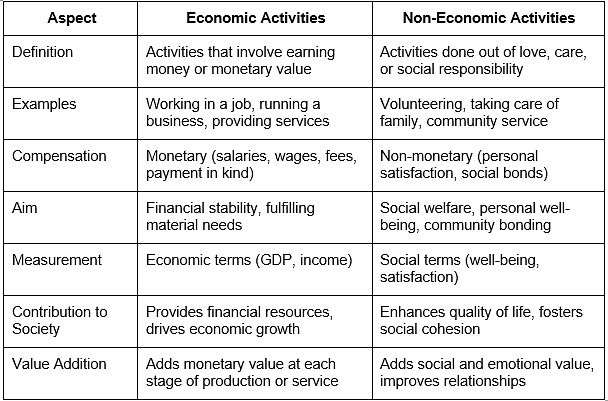Chapter 12 Grassroots Democracy — Part 3: Local Government in Urban Areas Solutions
November 5, 2024Chapter14 Economic Activities Around Us Solution
November 5, 2024Chapter 13 The Value of Work Text Book Solution
The Big Questions (Page 183)
Q1: What are the different types of activities that people engage in?
Ans: People engage in various types of activities, broadly categorized into economic and non-economic activities. Economic activities involve earning money or monetary value, such as working in a job, running a business, or providing services. Non-economic activities are done out of love, care, or social responsibility, like volunteering, taking care of family members, or community service.
Q2. What is their contribution to our everyday lives?
Ans: Both economic and non-economic activities significantly contribute to our everyday lives. Economic activities provide financial stability and fulfill material needs by generating income and facilitating trade. Non-economic activities enhance social welfare, personal well-being, and community bonding, improving the overall quality of life and fostering a supportive and caring society.
Back Exercises (Page 193)
Q1: How are economic activities different from non-economic activities?
Ans:

Q2: What kind of economic activities do people engage in? Illustrate with examples.
Ans: People engage in various economic activities such as working as a farmer selling produce, a teacher earning a salary, a software engineer developing applications, and a shopkeeper running a retail business. These activities involve earning money and contributing to economic value.
Q3: There is great value attached to people who are engaged in community service activities. Comment on this statement.
Ans: Community service activities are valuable because they contribute significantly to society by improving the lives of others and fostering a sense of solidarity and support. Although these activities may not involve monetary compensation, they create a positive impact, promote social cohesion, and enhance the quality of life.
Q4: What are the various ways in which people are compensated for various economic activities? Give some examples.
Ans: People are compensated for economic activities through salaries (e.g., teachers, office workers), wages (e.g., factory workers, labourers), fees (e.g., doctors, lawyers), and payment in kind (e.g., farm labourers receiving goods like mangoes).

